牛津译林版高中英语必修一Unit 2《Growing pains》(Home alone)教案
- 格式:doc
- 大小:86.00 KB
- 文档页数:5
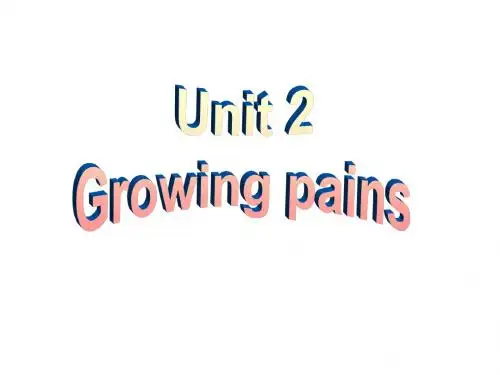
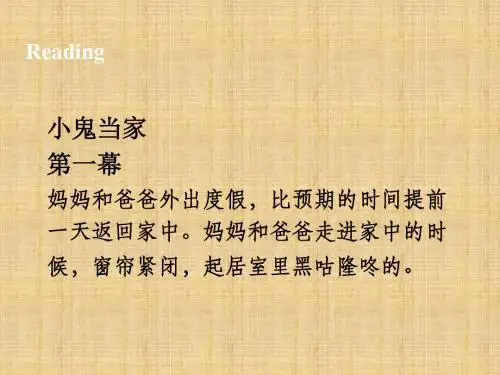
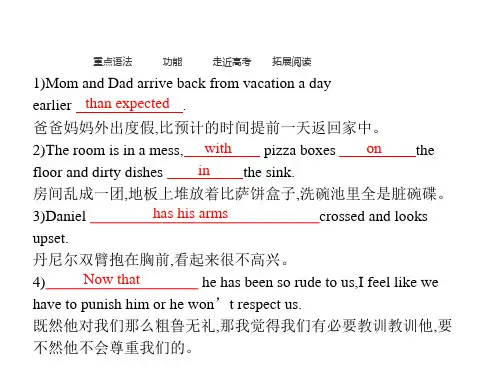
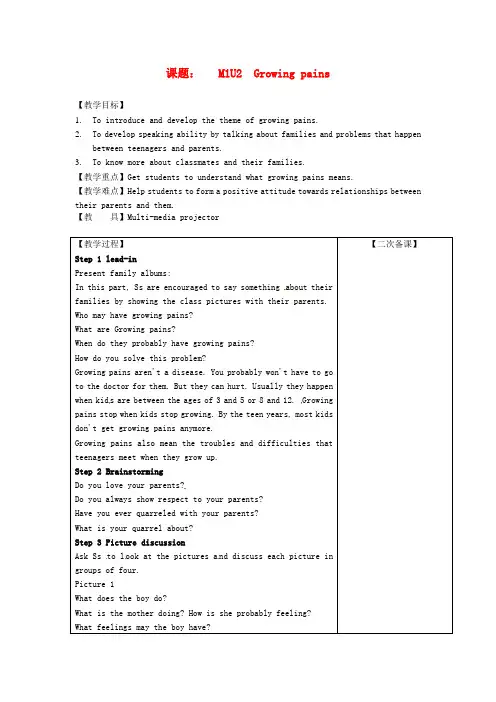
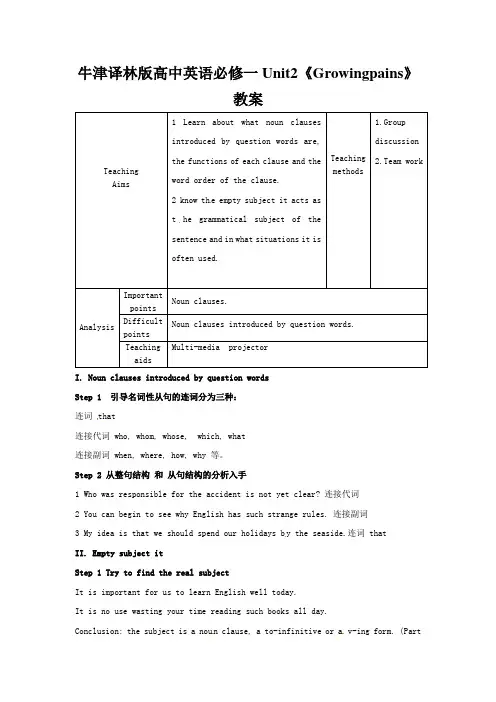
牛津译林版高中英语必修一Unit2《Growingpains》教案Teaching Aims 1 Learn about what noun clausesintroduced by question words are,the functions of each clause and theword order of the clause.2 know th e empty subject it acts ast he grammatical subject of thesentence and in what situations it isoften used.Teachingmethods1.Groupdiscussion2.Team workAnalysis ImportantpointsNoun clauses.DifficultpointsNoun clauses introduced by question words. TeachingaidsMulti-media projectorI. Noun clauses introduced by question wordsStep 1 引导名词性从句的连词分为三种:连词that连接代词 who, whom, whose, which, what连接副词 when, where, how, why 等。
Step 2 从整句结构和从句结构的分析入手1 Who was responsible for the accident is not yet clear? 连接代词2 You can begin to see why English has such strange rules. 连接副词3 My idea is that we should spend our holidays b y the seaside.连词 thatII. Empty subject itStep 1 Try to find the real subjectIt is important for us to learn English well today.It is no use wasting your time reading such books all day.Conclusion: the subject is a nou n clause, a to-infinitive or a v-ing form. (PartA on Page 31Step 2 Translation:1 要把握一门外语是困难.It is hard to master a foreign language.To master a foreign language is hard.Read Part 1 on Page 30.Step 3 Rewrite the sentencesIt seems that he speak two languages.= He seems to speak two languages.My new neighbor happens to come from my hometown.=It happens that my new neighbor come from my hometow n.Draw students’ attention to P art 2 on page 30.Step 4 how to emphasize the eleme nt in a sentence by using Empty Subject it Jane gave Mary a handbag at Christmas.It was Jane that / who gave Mary a handbag at Christmas.It was Mary that Jane gave a handbag (to) at Christmas.It was a handbag that John gav e Mary at Christmas.It was at Christmas that John gave Mary a handbag.Conclusion: It + be的一定形式+被强调部分+that /who分句形式主语和形式宾语的应用:当主语从句比较长,主句比较短时,通常用形式主语it,而把从句放在后面,如:(1)It is said that they have succeeded in working out the problem.(2)It was important that we should make the plan carefully.(3)It remains a secret how the animals came to live in the sea.当宾语从句后面有补语的时候,我们也需要用形式宾语it, 而将宾语从句放在补语之后,如:(1)I found it very difficult that one learns several languages at the same time.(2)He thinks it necessary that we should be given more time practising oral English.(3)He made it clear that he would leave the office soon.Step 5 ConsolidationGrammar1. 1. promise v. 许诺,承诺。
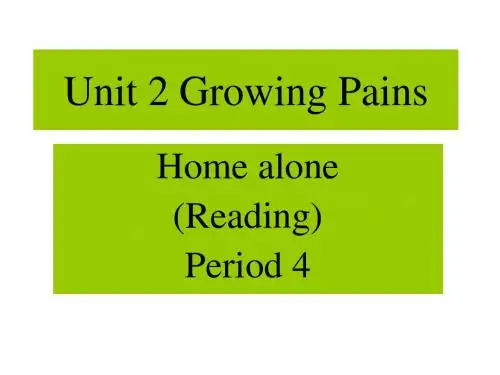
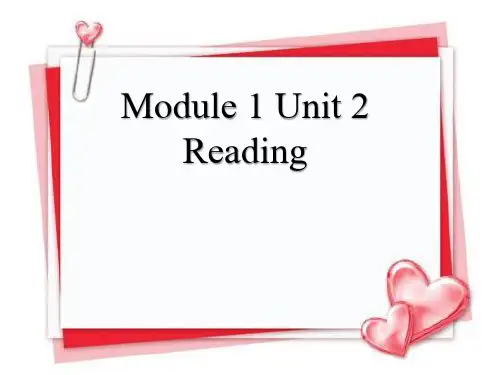
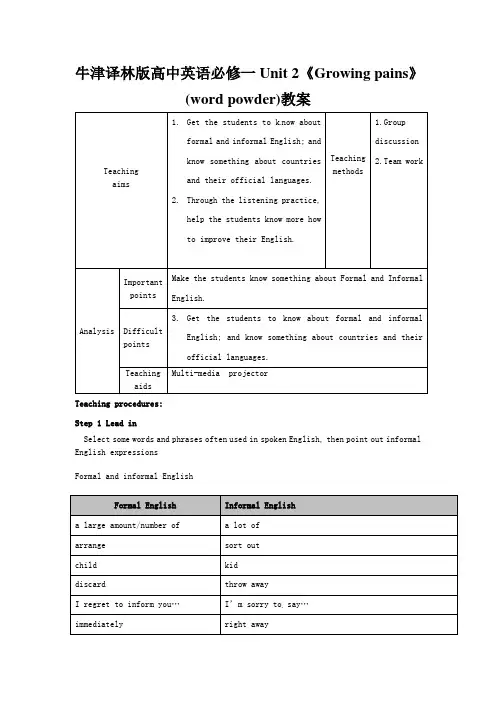
牛津译林版高中英语必修一Unit 2《Growing pains》(word powder)教案Teaching aims 1.Get the students to k now aboutformal and informal English; andknow something about countriesand their official languages.2.Through the listening practice,help the students know more howto improve their English.Teachingmethods1.Groupdiscussion2.Team workAnalysis ImportantpointsMake the students know something about Formal and InformalEnglish.Difficultpoints3.Get the students to know about formal and informalEnglish; and know something about countries and theirofficial languages.TeachingaidsMulti-media projectorTeaching procedures:Step 1 Lead inSelect some words and phrases often used in spoken English, then point out informal English expressionsFormal and informal EnglishFormal English Informal Englisha large amount/number of a lot ofarrange sort outchild kiddiscard throw awayI regret to inform you…I’m sorry to say…immediately right awayin addition plusIt is my hope…Hop e…prevent stoppurchase buyreply answ erspeak to have a word withStep2 PracticeAsk students to practice what they have learnt above.First point out the informal places while they are reading the letter.Then rewrite the letter in formal English.Answers:Dear Mr. Smith,I want to speak to you about the condition of the playground. I regret to inform you that people do not discard their rubbish properly. They leave rubbish on the ground instead of using the bins. Yesterday a 6-year-old child fell and cut his hand on a broken bottle. The boy was taken to hospital immediately. In addition, the beautiful vie w of the park is spoiled.I believe that there are a large number of actions you could take to solve this problem. For example, you should purchase additional litter bins and a rrange security to prevent people from littering.It is my hope that you will take my concerns into consid erat ion. I look forward to your reply.Yours sincerely, Jerry BrokerStep3Word power ( Group work )1. How many languages are spoken in the world today?( About 6,000)2. Do you know the ten most widely spoken languages? What are they?( They are Chinese, English, Hindi, Spanish, Russian, Arabic, Bengali, Portuguese, Malay and French..)①. Organize students into groups o f four and provide each group with a word map. Have each group write down as many names of countries and their official languages as possible.Use the following diagram as a pattern to organize the information.Country Official language(s) Country Officiallanguage(s)Australia English Mexico SpanishBengal Bengali New Zealand English, MaoriCanada English, French Portugal P ortugueseChinese Chinese Russia RussianEgypt Arabic Saudi Arabia ArabicFrance French Singapore English, Chinese, Malay, Tamil Germany German Spain SpanishIndia English, Hindi Switzerland French, German, ItalianIreland English, Irish U. k EnglishItaly Italian USA English②. Then have students finish Part A and share their answers with their group members.Step 4 Listening practiceAsk students to do the exercises in Parts A and B in listening on page 98 i n their Workbook. Let them know more about how to improve their English.Step5 Summary and homeworkWe’ve known something about formal and informal English, deal with s ome words and expressions related to languages, and go over the names of countries and their language(s).Use these skills to enlarge or reinforce your vocabulary and try your best to improve your English.Homework:1.Go over what we learned in this period.2.Preview the next lesson3.To get more information about UN, according to the website given to you . 教学反思:。
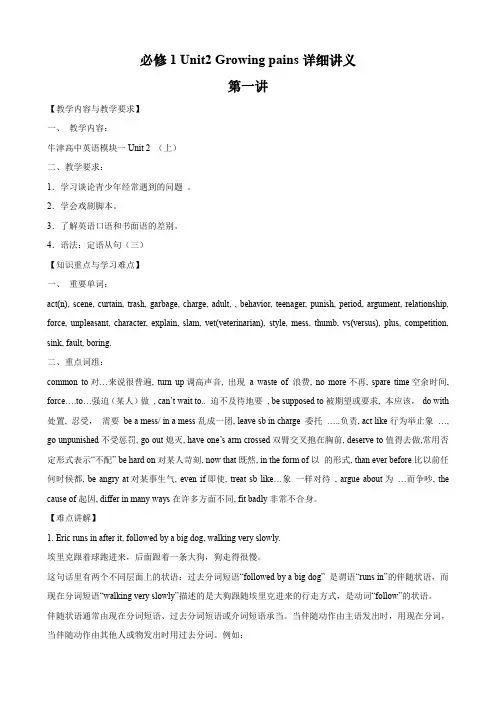
必修1 Unit2 Growing pains详细讲义第一讲【教学内容与教学要求】一、教学内容:牛津高中英语模块一Unit 2 (上)二、教学要求:1.学习谈论青少年经常遇到的问题。
2.学会戏剧脚本。
3.了解英语口语和书面语的差别。
4.语法:定语从句(三)【知识重点与学习难点】一、重要单词:act(n), scene, curtain, trash, garbage, charge, adult, , behavior, teenager, punish, period, argument, relationship, force, unpleasant, character, explain, slam, vet(veterinarian), style, mess, thumb, vs(versus), plus, competition, sink, fault, boring.二、重点词组:common to对…来说很普遍, turn up调高声音, 出现a waste of 浪费, no more不再, spare time空余时间, fo rce….to…强迫(某人)做, can’t wait to.. 迫不及待地要, be supposed to被期望或要求, 本应该,do with 处置, 忍受,需要be a mess/ in a mess乱成一团, leave sb in charge 委托…..负责, act like行为举止象…, go unpunished不受惩罚, go out熄灭, have one’s arm crossed双臂交叉抱在胸前, deserve to值得去做,常用否定形式表示“不配” be har d on对某人苛刻, now that既然, in the form of以的形式, than ever before比以前任何时候都, be angry at对某事生气, even if即使, treat sb like…象一样对待, argue about为…而争吵, the cause of起因, differ in many ways在许多方面不同, fit badly非常不合身。
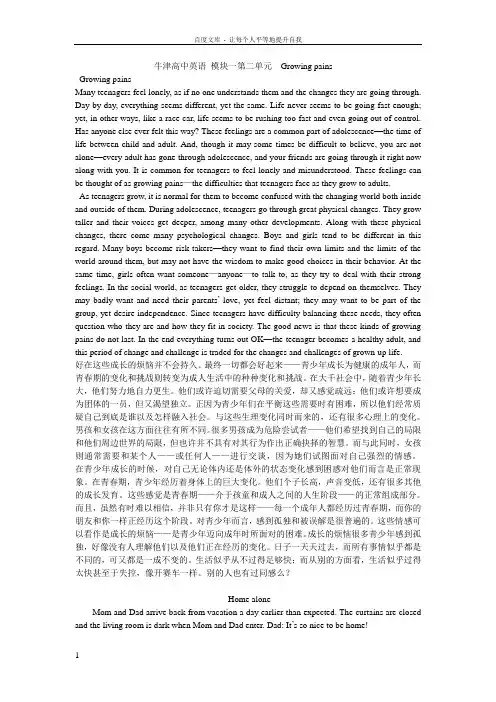
牛津高中英语模块一第二单元Growing painsGrowing painsMany teenagers feel lonely, as if no one understands them and the changes they are going through. Day by day, everything seems different, yet the same. Life never seems to be going fast enough; yet, in other ways, like a race car, life seems to be rushing too fast and even going out of control. Has anyone else ever felt this way? These feelings are a common part of adolescence—the time of life between child and adult. And, though it may some times be difficult to believe, you are not alone—every adult has gone through adolescence, and your friends are going through it right now along with you. It is common for teenagers to feel lonely and misunderstood. These feelings can be thought of as growing pains—the difficulties that teenagers face as they grow to adults.As teenagers grow, it is normal for them to become confused with the changing world both inside and outside of them. During adolescence, teenagers go through great physical changes. They grow taller and their voices get deeper, among many other developments. Along with these physical changes, there come many psychological changes. Boys and girls tend to be different in this regard. Many boys become risk-takers—they want to find their own limits and the limits of the world around them, but may not have the wisdom to make good choices in their behavior. At the same time, girls often want someone—anyone—to talk to, as they try to deal with their strong feelings. In the social world, as teenagers get older, they struggle to depend on themselves. They may badly want and need their parents’love, yet feel distant; they may want to be part of the group, yet desire independence. Since teenagers have difficulty balancing these needs, they often question who they are and how they fit in society. The good news is that these kinds of growing pains do not last. In the end everything turns out OK—the teenager becomes a healthy adult, and this period of change and challenge is traded for the changes and challenges of grown-up life.好在这些成长的烦恼并不会持久。

Periods 2-3 Reading教学设计一整体设计教材分析This reading passage is a play named “Home alone”, which is about a big fight an American family had. Because of lack of communication, Mum and Dad scolded Daniel and Eric when they saw the house in a mess after returnin g from their vacation. And Daniel didn’t want to explain what had happened to his parents. Thus, misunderstanding and conflicts occur in the family. As we know, boys and girls from the ages of 9 to 14 have many growing pains. That is to say, the rapid growth of the teenagers may not only result in pains in their arms and legs, but also may lead to the change of their psychology, which will often make them puzzled and misunderstood in their daily life. This play just showed us part of those conflicts between the parents and the teenagers, which often occur in the family nowadays. The students are quite familiar with these problems they often meet in their family life. It is certain that they have a lot to talk with each other. They can share their feelings and discuss and find some solutions to different kinds of problems they come across. By learning this unit, the teacher can also guide the students to form good attitude towards life and help them to find good methods to solve the problems they meet.While the students are reading this play, some reading strategies about how to read a play should be introduced. That is, most plays are in the form of a dialogue, which is quite different from reading a normal text. Therefore, a large amount of casual speech is used, sometimes with incomplete sentences. To really understand a play, the students should read the dialogue aloud.Meanwhile, different in-class activities should be well organized for all the students to take part in with the purpose of training their skills in not only reading, but also listening, speaking and playing. Some charts and tables are used for the students to find some information for the text. And the students should be encouraged to act out the play and make new plays according to their own experiences during their daily life. They should learn to enjoy team-work. More in-class activities are related to the students’ daily life and require common sense from the students. And more exercises are given in different forms to help the students to learn how to use some of the new words and phrases.三维目标1. Train the students’ reading ability, introducing the way to read a play—read it out aloud instead of silently to better understand a play and pay attention to the instructions or tips included in a play.2. Enable the students to talk about problems common to teenagers.3. Encourage the students to act out the play and make their own plays according to their own experiences in their daily life.4. Help the students to compare the differences in relationship between parents and their teenagers in the USA and China.5. Learn some useful words and expressionsact, vacation, curtain, surprise, bend, touch, explain, mess, can, leave, charge, adult, reason, trust, behavior, unpunished, teenager, fault, scene, mad, rude, punish, cash, be supposed to, do with, trash can, in charge, not. . . anymore, be hard on, now that6. Learn some important sentence structures1)I can’t wait to surprise the boys!2)The money with which you were to buy dog food is gone, but Spot looks so hungry!3)Eric sits on his bed looking at Daniel, who has his arms crossed and looks angry.4)I feel like we have to punish him or he won’t respect us.5)We didn’t think you would let the house get so dirty.重点难点1. Help the students to learn the play about an American family and talk about the relationship between the teenagers and their parents.2. Help the students to learn to use some of the new words and expressions.3. Help the students to learn to make a play about problems common to teenagers.教学方法1. Discussion in pairs or in groups.2. Play acted by the students.3. Task-based in-class activities.4. Explanations of some language points.教具准备A tape recorder and a multimedia classroom.课前准备1. Ask the students to prepare for a free-talk for about two or three minutes. They can introduce their family to their classmates or say something about their family life, or even describe their conflicts between their parents and them. This will help all the students to take part in in-class activities and help them get involved in the topic quickly. If some students really have some difficulty in doing this, the teacher can help them to prepare for it before class.2. Ask the students to make a survey among the students about relationship or the conflicts between teenagers and their parents. If possible, the students can make a questionnaire to do the survey. By doing this, the students can not only learn to make a questionnaire in groups, but also learn about the problems they, as well as their fellow schoolmates face during their family life. Different groups are encouraged to compare notes with each other after their separate surveys.Sample questionnaire 1Q1. How do you get along with your parents?A. Very well.B. Well.C. Not very well.D. Poorly.Q2. Do you often communicate with your parents?A. Very often.B. Often.C. Sometimes.D. Rarely.Q3. Do you often quarrel with your parents?A. Very often.B. Often.C. Sometimes.D. Rarely.Q4. Do you and your parents often have fun together?A. Very often.B. Often.C. Sometimes.D. Rarely.Q5. Do you and your parents often have a discussion over some family issues?A. Very often.B. Often.C. Sometimes.D. Rarely.Q6. Do your parents often force you to do something that they think you should do?A. Very often.B. Often.C. Sometimes.D. Rarely.Q7. Do your parents often make a decision for you about your study?A. Very often.B. Often.C. Sometimes.D. Rarely.Q8. Do your parents often interfere with your personal life?A. Very often.B. Often.C. Sometimes.D. Rarely.Q9. Do you think your parents understand you?A. Yes.B. No.C. Uncertain.Q10. Do you think that there is a generation gap between you and your parents?A. Yes.B. No.C. Uncertain.Sample Questionnaire 2Causes of conflicts Please tick1. Don’t allow me to play computer games.2. Don’t allow me to play with my friends outside.3. Don’t allow me to listen to MP3/MP4.4. Don’t allow me to join the school footbal l club.5. Don’t allow me to make my own decisions about my study.6. Don’t allow me to spend too much time on my interests.7. Don’t allow me to choose the career by myself.8. Don’t allow me to say “No” to their decisions.9. Don’t allow me to stay up too late.10. Don’t allow me to surf the Internet or chat on line.11. Force me to practice playing the piano every day.12. Force me to do extra exercises they arrange for me.13. Force me to learn English on Sundays.14. Force me to spend all my free time on books and exercises.15. Force me to come back home on time.16. Force me to stay at home during my vacation.17. Force me to go to bed before 9: 30 p. m.18. Force me to lose touch with my friends.19. Force me to swear that I’ll try my best to get high marks.20. Force me to stay away from my favorite music.3. Ask the students to surf the Internet or go to the library to get some information about the American TV show. . . Growing Pains. If the students have no access to either the Internet or the library, ask them to read the passage “Growing Pains—An American TV show” on page 98 to get some information. Encourage the students to describe part of the TV show.4. Ask the students to read the passage “Home alone” on page 22 to 25, as well as reading strategy on page 23. If time permits, ask them to finish exercises C1, C2, D1 and D2 on page 24.教学过程→Step 1 Greetings and free talkWhile the students are learning this unit “Growing pains”, they are encouraged to give a free talk about the misunderstanding and problems between parents and teenagers. The students are encouraged to articulate their thoughts by either speaking about their own experiences or combining what they have heard or seen with the facts presented.→Step 2 Lead inA sk the students to play the “problem and solution” game to get more students involved in the topic today. That is, the students volunteer to describe one of the serious parent-teenager problems or conflicts that happen in their families. Other students volunteer to give their suggestions to these problems.Your problems Solutionsmaking friends . . .surf the Internet . . .. . . . . .Sample performance 1Problem:As you know, I’m an active boy who has lots of friends. I have a good friend who was my classmate when we were in primary school. She is a lovely girl and she studies in another high school. We often compare notes with each other about our study, our interests, our school life, our opinions about some events at home and abroad. My parents suspect that I have fallen in love with the girl and say that the friendship will have a bad influence on my study. I told them that we are just good friends, but they don’t trust me. They consider what I said to be a lie and an excuse. I’m so annoyed. What’s more, they even telephoned my class teacher to make enquiries about my behavior and social activities at school. My god! They almost drive me mad. I really don’t wantto stay at home now.Solution:In my opinion, it’s better to share your feelings with your parents. You can have a talk with them peacefully, telling them that you are just good friends, and you just telephone and write letters to each other to share your opinions and feelings in your study. And you encourage each other to study hard. You can tell your parents what kind of girl she is—a hardworking, loyal, modest, intelligent kind-hearted girl. Maybe what you said will remind your parents of their school life when then were teenagers. Have a try, and you’ll benefit from the talk with your parents.Sample performance 2Problem:One of my problems is that I like computers very much. Some of my friends say that I’m crazy about it. I like surfing the Internet, chatting with my e-pals, searching information on the Internet, reading about news at home and abroad from it. Sometimes I even do my homework with the help of the Internet. Now and then, I will play on-line games. What I have done made my parents sad and angry. I explained to them that the widespread use of computers had made our life much more convenient and had helped me a lot in my study. I even told them that I could perform the computer well and that would not affect my study. But they would not listen to me. They said that I was addicted to computers. They just compared computers with drugs. Now they force me to stay at home at the weekend and forbid me to go to the Internet café. What should I do now? How can I persuade them to let me arrange my spare time by myself?Solution:In that case, firstly, you should work hard to make sure that you can achieve high marks and do well in your study. Secondly, you can show your parents that computers really bring us a lot of convenience in our life and will do good to our study. Thirdly, you can teach your parents how to use the computer. In this way, they will learn about computers and they will know what you are doing on the Internet, which will not worry them any more. From my point of view, we should communicate a lot with our parents. Only in this way can we get along with each well.The purpose of this activity is to help all the students to participate in the in-class activities. This topic is quite familiar to them in their life and it is certain that it will arouse the students’ interests.(If the multimedia is available, this design is recommended. )Show the students parts of the famous TV show “Growing Pains”, which was very popular during the 1960’s and 1970’s. Make sure that the parts of the TV show selected can represent the common family problems. After watching it, the teacher can ask the students to describe the plot, make comments on what has happened in the play, analyze the characters in the play and discuss the problems, which are similar to what has happened in their own daily life. The teacher can start by asking some of the following questions:Have you ever seen the famous TV show “Growing Pains”? What do you think of the play?Have you ever the experience of being left alone at home by your parents? If so, is there anything special that has happened to you?Do you think that you can deal with everything at home alone and take all the responsibility?Do you enjoy the pleasure of your age? Or do you want to be an adult or do you want to go back to your childhood? Why?Do you think that you suffer a lot of pains while you are growing up? What kind of difficulties or worries have you ever met? How do you deal with them?Do you think that your parents consider you as one of the reliable family members at home? If not, what should you do?The purpose of this is to attract student s’ interest and inspire their imagination. The teacher should give more opportunities to the students to encourage them to express their own opinions and ideas.→Step 3 ReadingBrainstormingBefore the students move on to the details of this play, ask them to have a brainstorming.Question:When we come to the title “Growing Pains”, what do you think of?Sample answers:1. It not only reminds me of the pains I have experienced during the past years, but also calls up those good old days in my childhood.2. This topic is what I’m interested in. I get along well with my parents. But some of my friends often complain that their parents can’t understand them. They usually quarrel with each other on their study issues.Reading strategyBefore asking the students to focus on reading the play, the teacher can help the students to come to the reading strategy of this unit. The teacher may begin like this:As Bacon once said, “Some books are to be chewed; some are to be swallowed; some are to be digested. ”That is, when we read different styles and formats of articles, we usually adapt different ways of reading in order to know about the main ideas of the article within the shortest time. For example, in Unit 1, we have learnt two of the basic reading skills—skimming and scanning. Ask the students to discuss different ways to read different types of articles. If necessary, the teacher can use the following table.Styles of articles Ways of reading (what to focus on)A playA news articleAn advertisementA noticeA letterA business letterA scientific articleAn instructionA surveyA story. . .After the students have fully discussed it, the teacher can ask each group to give their opinions.Possible answers:Styles of articles Ways of reading (what to focus on)A play in the form of a dialogue; characters; instructionsA news article what; when; where; who; how; whyAn advertisement no formal sentences; specific wordsA notice what; when; where; who; howA letter feeling of the writer; for what purposeA business letter what; why; resultA scientific article pay attention to the scientific termsAn instruction key words; how; attentionA survey figures; for what purposeA story who; what; when; where; why; how. . .The teacher should guide the students to focus on the way of reading a play. The teacher can ask the following questions to draw the students’ attention.Are the words or speeches in a play very formal?Are there any instructions or tips included in a play? What do the instructions or tips do?Do you think you have to read a play silently or read it out loud?Then the teacher can ask the students to focus on the “Reading strategy-reading a play” on page 23. If possible, the teacher should point out like this: A play has a unique format and style. Most plays are in the form of a dialogue. A large amount of casual speech is used, sometimes with incomplete sentences. In order to have a better understanding of a play, we should read it out loud instead of silently and we have to pay attention to the instructions or tips included in a play. If possible, the teacher can draw the students’ attention to how to get the main point of a play. That is, in a simple but strong play, there is often a conflict between the Good and the Bad. Their problems and relationships are often too complex for the characters themselves to solve. Although the reader can see which is the Good and which is the Bad, the play is about the struggle between them. Often a higher, wise character is needed to find the solution. In some plays, the Bad is often just one single character, with maybe one or two helpers. The Good usually has two or more helpers on his side. In a tragedy, the Good loses and the Bad wins. In a comedy, the Good wins, and the Bad loses. If time permits, the students are encouraged to give their own opinions.Listening for informationAsk the students to skim the passage and finish Part A individually. Then check the answers.The answers to Part A:1. Eric, Daniel, Mom and Dad.2. The room was a mess. /There was trash all over the place.3. Spot was ill.Scan for informationAsk the students to scan the play to finish C1 and C2 on page 24.For C1, after the students finish scanning the passage, the teacher can ask some students to read the sentences out, telling the students to pay attention to their tones and intonations. Meanwhile, ask other students to point out the feelings when the characters said that in the play.Suggested answers:1. Dad is really very angry when he finds the house in a mess.2. Daniel feels angry too when he is done wrong by his parents.3. Dad feels relaxed and happy to get home.4. Daniel feels sorry and he wants to explain it to them.5. Eric feels surprised at his parents’ coming back early and also a little bit frightened.6. Dad is cross with Daniel’s behavior and wants to punish him.7. Mom is angry and is blaming Daniel.For C2, the teacher can ask the individual student to read each sentence, and he or she can ask one of the other students to decide whether the sentence is true or false. If it is false, let him or her correct it.Read for more detailsAsk the students to read the play a second time and tell them to pay attention to the fact that the play has two acts, each with different themes. Encourage the students to read it out aloud, with different students acting different characters. Remind the students to put emphasis on the instructions or tips of the play and encourage them to think about whether these instructions or tips are necessary and helpful. After reading, ask the students to finish the following form:Characters happening feelings reactionsDad and MomDanielEricSample answers:Characters happening feelings reactionsDad and Mom arrive at home earlier relaxed, happy to surprise boysroom in a mess very angry to shout at boysdog tired and hungry to blame Danielmoney gone decide to punishDaniel parents’ misunderstanding angry and sad slam the door; hate them Eric parents’ coming early frightened and sorry want to explain all Further understanding of this playTo help the students to improve their reading skills, the teacher can also prepare several reading comprehension exercises for the students to do.1. The reason why the dog walks slowly to the couple is that the dog_____________ .A. ate too much to walk fastB. was seriously illC. just returned from a long walk and was tiredD. was given nothing to eat2. Why were the boys angry? The reasons are as follows EXCEPT that_____________ .A. th e parents didn’t give the boys a chance to explainB. the parents didn’t believe in the kidsC. the boys were attacked by the dogD. the parents thought the kids were of great fault3. The reason why the house was so dirty is that_____________ .A. Spot pulled the dirty out of the trash canB. the kids forgot to clean the room upC. the parents were back on day earlier than expectedD. the kids had no time to clean it4. Which statement is TRUE according to the text?A. The parents thought the kids would act as adults.B. Eric slammed the door.C. Spot was one of the couple’s sons.D. The parents asked Spot something instead of shouting at the kids.Keys: 1. B 2. C 3. D 4. APlot of the playThis time, ask the students to work in groups to discuss the plot of this play according to the following table. The purpose of this activity is to get more students involved in in-class activities, as well as to help the students to know how a play is usually organized, and how a play develops. In this way, the students will form their own way to write a play.Plot of the play DescriptionBackgroundProblemRising actionClimaxOutcomeIf the students are uncertain about what to do, the teacher should give some hints. For example:Plot of the play DescriptionBackground (information about characters, time, and place, etc. ) Problem (conflicts between two sides)Rising action (what causes the incident)Climax (the most serious conflict)Outcome (end of the conflict)Sample answers of the development of the play:Background: Dad and Mom go on vacation. Two boys, Daniel and Eric are left alone at home. They are asked to look after the pet dog, Spot, as well as their home.Problem: Spot gets ill and the two boys use the money for dog food to take Spot t o the vet. And they don’t have time to clean the house.Rising action: When Dad and Mom come back home, they find that the room is a mess, and the dog looks tired and hungry. What’s more, the money for the dog food is gone.Climax: Dad and Mom shou t at Daniel angrily and blame him for his not taking responsibility. Daniel can’t bear it and shouts back to his parents and rushes into his bedroom and slams the door.Outcome: (ask the students imagine what will happen. . . )Guessing the meanings of the new wordsThe main point of the play and some of the details have been further discussed. Now, it’s time to come to some new words in the play. Ask the students to turn to page 24, and come to Part D1 and D2. Ask them to find these new words in the play, guess their meanings from the context and then match them with their meanings.(Give the students several minutes to finish this part. Then check the answers. )To see if the students have fully understood these new words, the teacher can design some exercises for the students to do. For example, the teacher can ask the students to fill in the blanks with the seven words.(Ask the students to fill in the blanks and then check the answers. )1. I live near an airport and passing planes can be heard night and day, which almost drives me_____________ .2. It’s_____________ to point your finger to others in that country.3. Is your father in Beijing on_____________ or on holiday?4. The boy_____________ to the teacher that he was caught in the heavy traffic the very morning.5. Everything got in a_____________ when I got there.6. Adults should learn to_____________ in kids.7. Think it over before you make your final_____________ .8. We are_____________ to come to our school before 7 a. m. every morning.9. You got such a low mark this time. I’m afraid that your father will not let you go_____________ .10. This TV program will mainly deal with problems about_____________ .(This kind of exercises can help the students to master the usage of some of the important words in this unit. If the students find it difficult to do, then the teacher can ask them to work in pairs first. )Sample answers: 1. mad 2. rude 3. vacation 4. explained 5. mess6. trust7. decision8. supposed9. unpunished 10. teenagersAfter the students finish this exercise, they will be asked to come to Part E. This part is a conversation between Mom and Daniel. Remind the students that this is the outcome of this play.(Ask the students to read out their answers, and check them. Give some explanations if necessary. )In-class activitiesDifferent in-class activities are very important in learning English. The play has been talked about a lot. Most of the students must have mastered the play well. It’s time for them to practice. The following steps are designed for the students to practice their spoken English, to consolidate what they have learnt, to enlarge their knowledge and to improve other abilities in learning English.Practice A (act out the play)The students can be divided into several groups and asked to act it out. A competition can be held to see which group is the best. The teacher should advise the students to imitate the tones and intonations of each character while reading. Remind the students to pay attention to the instructions and tips.Practice B (add an ending to the play)Ask the students to use their imagination and think of an ending of the play. The students are encouraged to have a discussion in groups. The teacher may get the students to start by asking the following questions:Do you think Eric and Daniel will explain to their parents what has happened? Or will the parents go and ask the two children what has happened?Suppose you were one of the two children, what would you do? Would you stay silent or would you offer an explanation to your parents? Which is a better solution in your opinion?After the discussion, the teacher can ask different groups to act out their plays. If possible, make some comments on their performances.One possible ending:Mom: Daniel, I need to talk to you about your behavior. Dad and I realize there is probably an explanation for why the house is so dirty, but you shouldn’t have run out of the room and slammed the door like that, which really made me very sad.Daniel: Mom, I’m sorry, but I was so angry! You want me to act like an adult but you and Dad treat me like a child. I feel that you don’t trust me, which made me depressed. Why didn’t you just ask me what had happened?Mom: Well, I know that grown-ups are supposed to make good decisions but sometimes we make mistakes. We were angry too. None of us stopped to think and we should have. I should have calmed down to listen to your explanation. That’s my fault. Can you explain to me now why the house was a mess and what you did with the cash we left?Daniel: Spot was sick, Mom. Eric and I didn’t want to call you and Dad on your vacation, so I used the money you left and some of my own to take him to the vet. We stayed there and waited for him all day. That is why we didn’t have time to clea n the house.Practice C (retell the play)Ask the students to retell the play. The teacher may start the activity by the following instructions:Suppose you are one of the characters in the play, retell the story.Sample retelling:Dad: My wife and I went on vacation last week. Before leaving, we asked our sons, Daniel and Eric to look after our house as well as our pet dog, Spot. They promised they would do as we told them to. We also left them some money to buy dog food. We did think that Daniel is old enough to take the responsibility. But to our great disappointment, when we got home one day earlier, we were surprised to find that our house was a mess, that the dog looked tired and hungry and that the money for the dog food on the table was gone. I really felt very angry with Daniel. I shouted at him, and said that he should act like an adult. Then I told him that our family was not the one where bad behavior went unpunished. But to my great surprise, Daniel got very angry too. He ran into his bedroom a nd slammed the door, which made me even angrier. I don’t think he respects us enough. My wife think we should go to have a talk with him and ask him what has happened. However, I don’t think it is necessary to do that, since he was so rude to us. I feel li ke we have to punish him.Daniel: I really feel annoyed these days. I’m wondering if there is a generation gap between my parents and me. Things goes like this: last week, my parents went on vacation. Before they left, they asked me to take care of our house, our pet dog, Spot, and my younger brother, Eric. I think I’m old enough to take the responsibility. I promised to them that I can deal with everything. But something unexpected happened. Spot got very ill, and we had no choice but to use the money for dog food to take him to the vet. And Eric and I spent all the day waiting for Spot. Of course, we didn’t have time to clean the house. What’s worse, when our parents got home, our house was in a mess. They got very angry with me and shouted to me without giving me a chance to explain what had happened. They even didn’t trust me. I hated them at that time. Eric suggested that I should have a talk with them. But I don’t think that they deserve to know the truth.Mom: . . .Eric: . . .Practice D (a TV interview)Suppose that Daniel is invited to a TV program. Make a dialogue between the TV host and Daniel.Sample dialogue:Host: We’re here on “Teenager Time” with our guest for the show, Daniel. Daniel, welcome。
英语译林牛津版必修1 Unit2精品教案(2)Module 1 Unit 2 Growing painsPeriod Two Home aloneI. Teaching aims1. Enable students to read the short play and learn the relationship problems of the family.2. Help students learn how to read a play.II. Teaching important & difficult points1. Learn how the family problem happens in the play.2. Learn the characteristics of a play.III. Teaching methods1. Ask Ss to do fast-reading to get general idea of the play.2. Ask them to do careful-reading to understand detailed information.3. Pair or group work to participate in class.IV. Teaching aidsTape recorder and blackboard.V. Teaching proceduresStep 1 Revision1. Check the homework.2. Review the contents in the last period.Step 2 Pre-reading1.Ask students to read the reading strategy on page 23 and learn how to read a play.T: Next, we are going to read a short play about an American family. Have you ever read English plays? Is it the same as reading a normal text? How should we read a play? Turn to page 23 and read the reading strategy. After reading it, I am sure you will know how to read a play.2.After students learn the way of reading a play, lead them to the short play on Pages 22 and 23. Make sure they know some key words about a play: act, scene and aside.T: According to your understanding, what’s the relationship between American teenagers and their parents like? Is it the same as Chinese?Step 3 Reading comprehension1. Get the students to read the short play on page 22 and see what happens in the American family. Read the play quickly and answer the questions in Part A. Students are given about 4 minutes to skim the play and answer the questions.Sample answers:1. The main characters are Eric, Daniel, Mom and Dad.2. Because the room is in a mess. / Because there is garbage all over the place.3. Spot was ill and was taken to the clinic by Daniel and Eric.2. Ask the students to read the play again and finish Parts C1 and C2.This task needs scanning s kill to check students’ understanding of some detailed informationabout the play. Give students about 5 minutes to finish it. 5 minutes later, check the answers with the whole class.Sample answers:C1: 1 T 2 F 3 F 4 F 5 T 6 FC2: 1 They are playing with a soccer ball.2 The room is in a complete mess.3 Because they left Daniel in charge.4 Spot was sick and they had to take him to the clinic.5 He wants to punish Daniel.3. Get the students to turn to Part D1 and D2.Let students work in pairs and do some practice about the words in D1 and D2. Deal with the questions students may ask. Then check the answers with the class.Sample answers:D1: 1 d 2 e 3 a 4 f 5 c 6 bD2: (1) garbage (2) behavior (3) rude (4) teenager (5) tolerate4.Play the tape and let students listen to it and pay attention to the intonations and tones.Step 4 AnalysisIn this step, students will do some discussion about the family problem and analyse the structure of this play.T: In this play, the parents and Daniel are not happy with each other. The parents thought Daniel didn’t act like an adult and make good decisions. Daniel was angry because he thought Dad and Mom shouted at him without giving him a chance to explain. Whom do you think should be blamed for? So what conclusion can we draw from the family fight? How can we avoid such unhappiness in life? Will you have a try?T: What kind of play is this play? Is it sad or funny? Is it a modern play or historical play?How many acts does the play have? And how many scenes does each act have? What are they? (It is about a sad story. And it is a modern play. The play has two acts. Act one has only one scene, that is the living room. Act two has two scenes. Scene one is Daniel and Eric’s bedroom. Scene two is not clear ly identified. I guess it is either the parents’ bedroom or the living room.)Step 5 Homework1. Finish Part E on Page 25.Sample answers: (1) explanation (2) supposed (3) cash (4) defend (5) clinic (6) Anyhow (7) emergency2. Do Exercise A1 on Page 94 in the exercise book.Postscripts:。
课题:M1U2 Home alo ne【教学目标】1. To help the students to understand the text better.2. To master the usage of some importa nt Ian guage poin ts.【教学重点】 How to improve the Ss ' readi ng ability.【教学难点】 Make sure the Ss know about how to deal with the problems 【教 具】Multi-media projectorin the family【二次备课】expect that …①我们谁也没预料到这种情况。
No ne of us expected it .我在等他的来信。
I ' m expecting his letter .③不要对他期望太咼。
Don' t expect too much of him.你预计什么时候回来?When do you expect to be back? 你别指望他会支持你。
You can' t expect him to support you .我想他会很快回来的。
I expect that he ' II come back soon 她会不会来呢?”“我想会/不会。
”“Will she come? ”“ I expect so/ not. ”2. surprise1). vt. 使惊奇;使惊讶What you said surprised me.I am surprised at what you said just now.What surprised me most was that the little boy could speak En glish so well. 2). adj. surprising 令人吃惊的surprised 吃惊的;受惊的a. It is that they lost.b. I am that they lost.c. She wore a look whe n she came into the room.n.令人惊奇的事(可数)吃惊;惊奇It was a pleasant surprise to see them again.To my surprise, he came back so soon.3. followa. 跟随you go first, an d I ' ll follow later.听从,采纳1 ' II follow your advice follow one's exampleb. followi ng vs. followedfollowi ng 接下来的,随后的in the followi ng years/ days分词作伴随作为现在分词跟过去分词,构成的短语可以充当状语,但意思相反A teacher came into the classroom, followed by a group of Ssfollow ing a group of Ss(一群学生紧跟其后,跟在一群学生后面)She sat at the table, readi ng a magaz ine.He stood there, not knowing what to do.4 be gone用完了,不在了I need to buy sth to drink, because all mywater is gone.5. in charge (of sth/sb) 负责,掌管某事主管,掌管;在……管辖之下,由……照顾* sb. be in charge of sth.某人负责,掌管,照顾* sth. be in the charge of sb. /in one s charge在……掌管之下,由……经管1. Mary is in charge of the hospital.The hospital is in the charge of Mary.2. The project is in the charge of Dr Gre . en.Dr Gree n is in charge of the project.* free of charge=for free6. stopa) ~ doing~ to dob) 停止某人做某事~ sb ( from ) doing sth=preve nt sb (from) doing sth=keep sb from doing sth7. have sb/sth doing have sb / sth doa. have …do ing 让…一直做某事b. have …do 让…做某事c. have sth done 使某事被做遭遇,经历8. deserve~ to do 应该做某事,值得做某事They ~ to know the truthThey didn ' t ~ to win.He killed a young lady and he deserved to be put intoprison.Tom did wrong and deserved puni shme nt/to be puni shed.9. in stead of vs. in steadIn stead of 后接的动作或状态是不做的In stead 连在一起的句子中的动作或状态是要执行的或存在的The water here is not good, so I am drinking beer in stead. we ll have fish in stead of meat for lun ch.10. With + 名词(代词) +介词短语/形容词/副词/分词/不定式He stood there with his hands in his pockets.She said goodbye with tears in his eyes.The teacher came in with a book in his han ds.Do you know the man with a child in her arms/With nothing to do , I went shopp ing.The boy lay on the grass, with his eyes look ing at thesky.She stepped out of the prison with her hands tied.11. leavea. 把…交给,委托…leave + n+ to/with+n 把… 托付给/委托给~ sb to do sth 委托某人做某事b. 使…处于某种状态! +n + adj./ 现在分词、过去分词、名词、介词短语Mrs Anny left her daughter with /to us and went shopping.The gover nment will leave buildi ng the museum to thatcompa ny.What he said left me thinking deeply.12 You weren' t supposed to come home until tomorrow!1 be supposed to do sth.发现者号航天飞机应该在8月8日返回.Shuttle Discovery was supposed to retur n on Aug 8 .校会应该在周一早晨举行.The school assembly was supposed to be held on Mon day morni ng.2 sup .pose …怎么样?Suppose you have ano ther try.Suppose we have an En glish party.3 suppos ing 假女口Suppos ing it rains, what will you do?Suppos ing he is late, shall we go first?=If ......13 I feel like we have to - punish h im or he …feel like如果想要,我们可以外出散步If you feel like, we can go out for a walk.我现在不想要大吃一顿.I don ' t feel like (having) a big meal now这种材料摸起来象丝绸.【教学后记】。